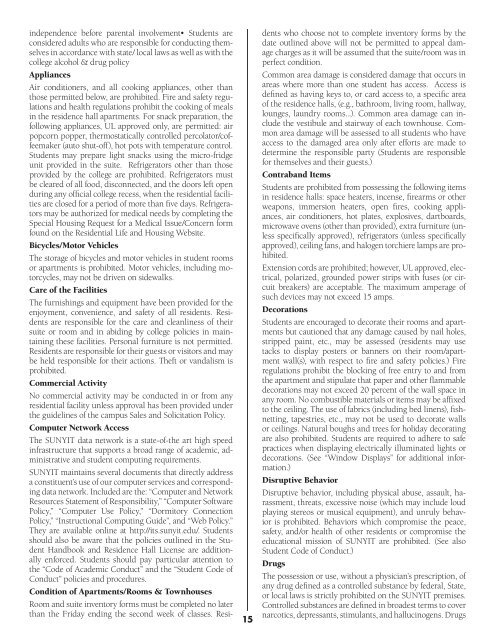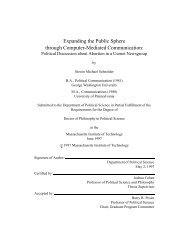student services - SUNY Institute of Technology
student services - SUNY Institute of Technology
student services - SUNY Institute of Technology
Create successful ePaper yourself
Turn your PDF publications into a flip-book with our unique Google optimized e-Paper software.
15<br />
independence before parental involvement• Students are<br />
considered adults who are responsible for conducting themselves<br />
in accordance with state/ local laws as well as with the<br />
college alcohol & drug policy<br />
Appliances<br />
Air conditioners, and all cooking appliances, other than<br />
those permitted below, are pro hibited. Fire and safety regulations<br />
and health regulations prohibit the cooking <strong>of</strong> meals<br />
in the residence hall apartments. For snack preparation, the<br />
following appliances, UL approved only, are permitted: air<br />
popcorn popper, thermo statically controlled percolator/c<strong>of</strong>feemaker<br />
(auto shut-<strong>of</strong>f), hot pots with temperature control.<br />
Students may prepare light snacks using the micro-fridge<br />
unit provided in the suite. Refrigerators other than those<br />
provided by the college are prohibited. Refrigerators must<br />
be cleared <strong>of</strong> all food, discon nected, and the doors left open<br />
during any <strong>of</strong>ficial college recess, when the residential facilities<br />
are closed for a period <strong>of</strong> more than five days. Refrigerators<br />
may be authorized for medical needs by completing the<br />
Special Housing Request for a Medical Issue/Concern form<br />
found on the Residential Life and Housing Website.<br />
Bicycles/Motor Vehicles<br />
The storage <strong>of</strong> bicycles and motor vehicles in <strong>student</strong> rooms<br />
or apartments is prohibited. Motor vehicles, including motorcycles,<br />
may not be driven on sidewalks.<br />
Care <strong>of</strong> the Facilities<br />
The furnishings and equipment have been provided for the<br />
enjoyment, convenience, and safety <strong>of</strong> all residents. Residents<br />
are responsible for the care and cleanliness <strong>of</strong> their<br />
suite or room and in abiding by college policies in maintaining<br />
these facilities. Personal furniture is not permitted.<br />
Residents are responsible for their guests or visitors and may<br />
be held responsible for their actions. Theft or vandalism is<br />
prohibited.<br />
Commercial Activity<br />
No commercial activity may be conducted in or from any<br />
residential facility unless approval has been provided under<br />
the guidelines <strong>of</strong> the campus Sales and Solicitation Policy.<br />
Computer Network Access<br />
The <strong>SUNY</strong>IT data network is a state-<strong>of</strong>-the art high speed<br />
infrastructure that supports a broad range <strong>of</strong> academic, administrative<br />
and <strong>student</strong> computing requirements.<br />
<strong>SUNY</strong>IT maintains several documents that directly address<br />
a constituent’s use <strong>of</strong> our computer <strong>services</strong> and corresponding<br />
data network. Included are the: “Computer and Network<br />
Resources Statement <strong>of</strong> Responsibility,” “Com puter S<strong>of</strong>tware<br />
Policy,” “Computer Use Policy,” “Dormitory Connection<br />
Policy,” “Instructional Computing Guide”, and “Web Policy.”<br />
They are available online at http://its.sunyit.edu/. Students<br />
should also be aware that the policies outlined in the Student<br />
Handbook and Residence Hall License are additionally<br />
enforced. Students should pay particular atten tion to<br />
the “Code <strong>of</strong> Academic Conduct” and the “Student Code <strong>of</strong><br />
Conduct” policies and procedures.<br />
Condition <strong>of</strong> Apartments/Rooms & Townhouses<br />
Room and suite inventory forms must be completed no later<br />
than the Friday ending the second week <strong>of</strong> classes. Residents<br />
who choose not to complete inventory forms by the<br />
date outlined above will not be permitted to appeal damage<br />
charges as it will be assumed that the suite/room was in<br />
perfect condition.<br />
Common area damage is considered damage that occurs in<br />
areas where more than one <strong>student</strong> has access. Access is<br />
defined as having keys to, or card access to, a specific area<br />
<strong>of</strong> the residence halls, (e.g., bathroom, living room, hallway,<br />
lounges, laundry rooms...). Common area damage can include<br />
the vestibule and stairway <strong>of</strong> each townhouse. Common<br />
area damage will be assessed to all stu dents who have<br />
access to the damaged area only after efforts are made to<br />
determine the responsible party (Students are responsible<br />
for themselves and their guests.)<br />
Contraband Items<br />
Students are prohibited from possessing the following items<br />
in residence halls: space heaters, incense, firearms or other<br />
weap ons, immersion heaters, open fires, cooking appliances,<br />
air conditioners, hot plates, explosives, dartboards,<br />
microwave ovens (other than provided), extra furniture (unless<br />
specifically approved), refrigerators (un less specifically<br />
approved), ceiling fans, and halogen torchiere lamps are prohibited.<br />
Extension cords are prohibited; however, UL approved, electrical,<br />
polarized, grounded power strips with fuses (or circuit<br />
breakers) are acceptable. The maximum amperage <strong>of</strong><br />
such devices may not exceed 15 amps.<br />
Decorations<br />
Students are encouraged to decorate their rooms and apartments<br />
but cautioned that any damage caused by nail holes,<br />
stripped paint, etc., may be assessed (residents may use<br />
tacks to display posters or banners on their room/apartment<br />
wall(s), with respect to fire and safety policies.) Fire<br />
regulations prohibit the blocking <strong>of</strong> free entry to and from<br />
the apartment and stipulate that paper and other flammable<br />
decorations may not exceed 20 percent <strong>of</strong> the wall space in<br />
any room. No com bustible materials or items may be affixed<br />
to the ceiling. The use <strong>of</strong> fabrics (including bed linens), fishnetting,<br />
tapestries, etc., may not be used to decorate walls<br />
or ceilings. Natural boughs and trees for holiday decorating<br />
are also prohibited. Students are required to adhere to safe<br />
practices when dis playing electrically illuminated lights or<br />
decorations. (See “Window Displays” for additional information.)<br />
Disruptive Behavior<br />
Disruptive behavior, including physical abuse, assault, harassment,<br />
threats, excessive noise (which may include loud<br />
playing stereos or musical equipment), and unruly behavior<br />
is prohibited. Behaviors which compromise the peace,<br />
safety, and/or health <strong>of</strong> other residents or compromise the<br />
educa tional mission <strong>of</strong> <strong>SUNY</strong>IT are prohibited. (See also<br />
Student Code <strong>of</strong> Conduct.)<br />
Drugs<br />
The possession or use, without a physician’s prescription, <strong>of</strong><br />
any drug defined as a controlled substance by federal, State,<br />
or local laws is strictly prohibited on the <strong>SUNY</strong>IT premises.<br />
Controlled substances are defined in broadest terms to cover<br />
narcotics, depres sants, stimulants, and hallucinogens. Drugs
















